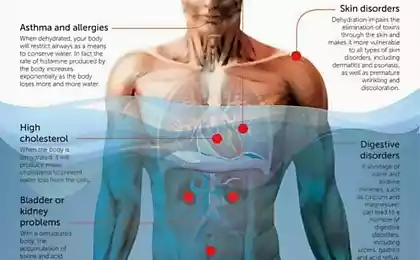1146
41 facts about stress

Stress has been called "the silent killer" that can lead to heart disease, high blood pressure, chest pain and arrhythmia.
There is a myth that stress triggers the appearance of gray hair, but in fact it leads to only loss. Essentially, telogen effluvium (hair loss) could begin as early as three months after a stressful event.
In 2009, the top most stressful occupations were: the surgeon, a commercial airline pilot, photojournalist, executive director of advertising and real estate agent. The least stressful professions are: a nutritionist, an astronomer, a systems analyst and software engineer.
The most "stressful" to relocate people in America: Chicago, Illinois, Los Angeles, California and New York.
Stress changes the composition of the neurochemical substances which can affect sexual function of the human body. Nervous excitement leads to problems with fallopian tubes and uterine cramps, which are further detrimental impact on the health of the woman. Stress in men and reduces the number of sperm motility, which will necessarily lead to erectile dysfunction. In fact, mental problems in 30% of infertility problems are.
Psychosis makes pimples more painful, causing inflammation of the skin. Researchers believe that the reason the problems associated with inflammation, rather than the rise of sebum (oily substance in the skin).
Laughter reduces stress hormones (eg, cortisol, epinephrine and epinephrine) and strengthens the immune system by releasing hormones into the blood health.
Stress hormone (cortisol) provokes not only the accumulation of abdominal fat, but also increases the number of individual fat cells around the theme that the researchers call "disease" fatties.
Stress is linked to six leading causes of death: heart disease, lung cancer, diseases of internal organs, accidents, cirrhosis of the liver and suicide.
Stress during courtship wife of a disabled husband, significantly increases the risk of stroke in women.
Chronic stress can disrupt the development of the growth in children by reducing the production of growth hormone in the pituitary gland.
In 2009 CNN poll shows that the number one reason for stress in most countries is money. Countries need more money in Malaysia, China, Singapore and the United States. Countries with less need of money: Russia, France and Italy.
The term "stress" comes from the Latin «stringere» (become harder).
In the excitement, there are positive features. When we have a concern, the main flow of blood does not enter the side capillaries, which limits bleeding if you get a wound.
During stress pupils dilate (mydriasis), just as they expand at the sight of attraction: that is, when you need to gather more visual information about the situation.
Chronic stress is saturated brain potent hormones, which are designed for short-term emergencies. Constant exposure to these hormones causes damage, reduction, and the killing of some brain cells.
A 2003 study showed that women with moderate levels of stress were in the category with a lower risk of suicide than women who had very high or very low levels of mental disturbances.
Scientists suggest that nervousness is part of an evolutionary way, because that's what it has allowed man to survive. In particular, stress, increases concentration and improves physical performance.
Studies have shown that dark chocolate reduces the amount of stress hormones such as cortisol and other "fight-flight" hormones. In addition, cocoa is rich in antioxidants called flavonoids.
Chronic stress increases the concentration of cytokines which trigger inflammation. Exposure to continuous inflammation itself causes damage to the arteries and vital organs.
Nerve situation alter blood sugar levels, which can cause mood swings, fatigue, hyperglycemia, metabolic syndrome, as well as become a major risk factor for heart attack and diabetes.
Chronic stress aggravates irritable bowel syndrome (IBS), a disease that causes irritation of the large intestine and causes constipation, cramps and bloating.
Studies have shown that HIV-infected men have little progress in healing, if they are under stress, than those who are in absolute tranquility.
Nervous disorders reduce the ability of the blood-brain barrier by filtering the blood, thereby weakening the protection of neurons in the brain from toxins, viruses, toxins and other toxic substances in the blood chemistry.
Acoustic irritation (caused by loud noises) can cause an attack of QT syndrome of extended interval (LQTS), disorders of the heart, and cause more than 3,000 deaths in the US every year.
Young people brought up in a family of military men, the most prone to stress and the occurrence of emotional problems than other teens.
Nervous anxiety increase the risk of preterm birth and the occurrence of intrauterine infection.
Post-traumatic stress alters the brains of children at the physical layer, in particular, reduced hippocampus, a part of the brain that stores and retrieves memories.
Chinese stress balls (baodinskie balls) were created in the period of the Ming Dynasty (1368-1644) in the city of Baoding, China. Initially, they were made of iron, and is believed to have served to relieve stress because it touched and put pressure on the acupuncture points of palms.
Stress can lead to headaches as a result of which the body redirects blood flow to other parts of the body.
Hyper-arousal due to stress triggers the body's response, which is the cause of chronic insomnia.
Early records of PTSD dating back to the eighth century BC in the "Iliad" of Homer where Achilles is experiencing strong nervous devastation after the fight in the Trojan War. Achilles complains of feeling emotionally "numb" and "deadness" expressing suicidal thoughts and anger.
When the cells of the body are reduced due to the impact of stress hormones, they are disconnected from each other, contributing to the emergence of the doldrums.
Men are more likely than women susceptible to the emergence of specific, stress-related disorders, including hypertension, aggressive behavior and alcohol / drugs.
Chronically low noise and low-frequency noise underestimation of human hearing provoke the production of stress hormones, which directly interfere with learning and work, and raise blood pressure, impair the immune system, increase aggression.
Stress creates hormonal changes in the human body, which is why there is a "broken heart syndrome» (BHS), or stress cardiomyopathy (severe weakness of the heart muscle). This condition occurs very quickly, usually in women. In Japan, BHS is called "octopus trap cardiomyopathy" because the left ventricle similar to a ball peculiar form.
























